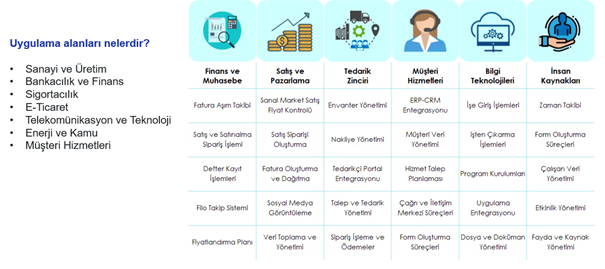What is RPA? Its History and RPA Consulting
RPA (Robotic Process Automation) is a technology that automates repetitive and rule-based business processes. RPA software mimics human interactions with digital systems to perform tasks such as data entry, transaction processing, and communication handling—particularly those based on structured rules and predictable logic.
History of RPA
The roots of RPA lie in the broader history of automation. However, modern RPA began to emerge in the early 2000s with basic automation tools such as screen scraping and simple data entry. Over time, more advanced RPA platforms were developed to automate increasingly complex and integrated business processes.
The evolution of RPA was fueled by advancements in computing power, memory capacity, and artificial intelligence. These developments enabled RPA tools to handle more sophisticated tasks and even make decisions that simulate human reasoning.
Today, RPA is widely adopted across various business functions—including finance, accounting, human resources, and customer service—offering improved efficiency, accuracy, cost savings, and the ability to free human resources for more strategic work.
With the integration of AI, machine learning, and natural language processing, the capabilities of RPA are expected to expand significantly, enabling the automation of more complex, cognitive workflows in the near future.
Does RPA Consulting Provide Value to Businesses?
RPA Consulting offers businesses expert guidance on implementing and managing RPA technologies. The proper deployment of RPA can deliver significant value through automation. Key advantages of RPA consulting include:
Process Analysis & Opportunity Identification: RPA consultants analyze current business processes to identify tasks that are suitable for automation and offer the highest return on investment.
Strategy Development: Consultants help define a tailored RPA strategy, including which processes to automate, which tools to use, implementation methods, and expected outcomes.
Platform Selection & Implementation: Consultants assist in selecting the most appropriate RPA platform based on business needs and oversee its deployment and integration into the organization.
Pilot Projects: Consultants support the launch of pilot RPA projects to demonstrate the technology’s value before scaling.
Training & Support: They provide hands-on training to employees and ongoing support to ensure effective RPA adoption.
Performance Monitoring & Optimization: Consultants continuously monitor RPA bots’ performance and recommend enhancements to maximize efficiency and value.
With proper consulting, businesses can harness the full potential of RPA to improve efficiency, reduce costs, enhance service quality, and boost customer satisfaction.
The Importance of RPA Consulting in the Digital Transformation Landscape
RPA Consulting plays a critical role in helping organizations navigate their digital transformation journeys. Its impact in the digital economy is increasingly significant:
Automation Expertise: Consultants provide deep knowledge in identifying and automating structured, rules-based processes across departments.
Project Leadership: They guide businesses through all phases of RPA implementation—from planning to execution, training, and scaling.
Efficiency and Cost Reduction: Through process automation, companies can achieve higher throughput with lower operational costs.
Enabler of Digital Transformation: RPA acts as a key component in digital transformation, supporting organizations in staying competitive by digitizing legacy workflows.
Technology Enablement: Consultants help internal teams build the skills and capabilities needed to manage and scale RPA projects independently.
By combining RPA with broader transformation strategies, businesses can gain significant competitive advantages, improve agility, and drive innovation.
Why Robotic Process Automation? The Role of RPA Consulting
With Robotic Process Automation, software bots can replicate human interactions with systems by mimicking how employees use applications—navigating user interfaces, inputting data, reading from databases, processing information, and generating reports.
RPA Consulting plays a crucial role in:
Helping process owners thoroughly define their tasks and responsibilities.
Supporting developers with detailed process documentation and scenario planning.
Ensuring each process is optimized, automated effectively, and aligned with business goals.
By guiding companies in developing, deploying, and scaling RPA initiatives, RPA consultants ensure the success of automation programs and drive sustainable value.
What Are the Application Areas of Robotic Process Automation?
The Relationship Between RPA Consulting and Data Analytics
RPA consulting enables organizations to develop data-driven automation solutions and build smarter automation strategies. The synergy between Robotic Process Automation (RPA) and data analytics leads to more intelligent, efficient, and scalable digital transformation initiatives. Below are the key points that illustrate this relationship:
1. Designing RPA Processes Using Data Analytics
Data analytics helps organizations derive actionable insights from large datasets. These insights can guide the design of RPA processes.
By analyzing operational data, businesses can identify which processes are best suited for automation.
Data-driven decisions help optimize workflows and prioritize high-impact automation opportunities.
2. Integration of RPA and Data Analytics
RPA automates repetitive, rule-based business tasks. When integrated with analytics platforms, RPA bots can consume and trigger actions based on analytical insights.
For example, an RPA bot can monitor a database for updates and relay specific information to a business intelligence tool for further analysis.
This integration enables real-time decision-making and automated report generation.
3. Enhancing RPA Performance through Analytics
Data analytics provides visibility into RPA performance and helps identify areas for improvement.
Key performance indicators (KPIs) such as bot utilization, execution time, and exception rates can be analyzed.
Based on these analytics, organizations can fine-tune their automation processes and increase return on investment (ROI).
4. Big Data and RPA Integration
Big Data analytics enables organizations to process and understand massive volumes of data. These insights can be used to inform and enhance RPA workflows.
For instance, a company analyzing customer behavior data through Big Data tools can develop or adapt RPA processes that improve customer service and engagement.
The integration of RPA consulting and data analytics empowers businesses to create smarter, more efficient, and highly responsive automation strategies. This collaboration gives organizations a significant competitive edge in today’s data-driven business environment.
Common RPA Platforms Used in the Industry
Several RPA tools are widely used across industries. Each has its own strengths and capabilities, making selection dependent on business needs. Key platforms include:
UiPath: Known for its user-friendly interface and advanced AI capabilities. Includes components such as UiPath Studio, Orchestrator, and Robots.
Automation Anywhere: Offers robust automation features including Task Bots, IQ Bots, and a Bot Store for reusable components.
Blue Prism: An enterprise-grade RPA platform emphasizing security and scalability.
Microsoft Power Automate: Formerly Microsoft Flow, this tool integrates well with the Microsoft ecosystem and provides an accessible entry point into automation.
AutomationEdge: Focuses on IT and business process automation with AI capabilities.
Kofax RPA: Offers strong features for document processing, workflow automation, and data integration.
RPA Consulting and UiPath
RPA consulting provides expert guidance for implementing RPA technologies, while UiPath is one of the leading software vendors in the RPA space. Here’s how they work together:
UiPath’s RPA Platform and Consulting Services
UiPath offers a comprehensive RPA platform that enables automation of various business processes.
Many RPA consulting firms implement UiPath solutions for their clients, helping them deploy, configure, and optimize UiPath in real-world scenarios.
UiPath Training and Certification
UiPath provides certification and training programs to help professionals become proficient in using its platform.
RPA consultants often leverage these programs to enhance their skills and train client teams effectively.
Collaboration Between UiPath and Consulting Firms
UiPath partners with consulting firms to deliver end-to-end RPA services.
These firms combine UiPath’s tools with their implementation expertise to offer tailored automation solutions to clients.
Deployment and Ongoing Support
RPA consultants assist in building and maintaining UiPath solutions, ensuring business continuity.
Consultants also adapt automation solutions to evolving business requirements and provide troubleshooting and continuous improvement.
Conclusion
The partnership between RPA consulting and UiPath enables businesses to fully leverage the power of automation. While UiPath delivers the technical infrastructure, RPA consultants offer strategic planning, process design, implementation, and optimization. Together, they help businesses increase efficiency, reduce costs, and gain a competitive advantage in the era of intelligent automation.



